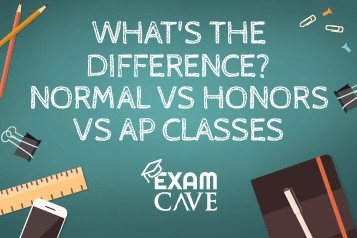What Are The Differences Between Normal, Honors, and AP Classes?

In a high school, students have to take required courses for graduation. Most of these classes are normal courses that all students can take, whether they plan on attending college or not.
Most schools require that high school students take courses in several subjects, including
- Math
- Language arts
- World language
- Science
- Social sciences
- Arts and technology
Table of Contents
Why Take AP or Honors Courses?
The standard courses do prepare students for college and life past high school. However, when students want to challenge themselves and better prepare themselves for college, they can take the Honors version of regular courses.
To earn college credit while in high school, they can take AP versions of the classes.
The most notable difference between AP and Honors courses is that AP courses have standardized tests that result in varying amounts of college credit. The AP test score and individual colleges determine how much credit students get based on their scores.
The higher the score, the more credit students earn.
Who Should Take an AP or Honors Course?
Students usually do not choose AP or Honors courses on their own. Usually, their teachers recommend them. Teachers consider several factors, including
- Test grades
- Reading and writing ability
- Work ethic
- Need for challenge
- Boredom in standard classes
- Love of learning
Often, schools provide Honors versions of courses in grades six through ten. After tenth grade, many schools direct their Honors students toward AP classes.
So, rather than taking an eleventh grade Honors English course, students take AP Language and Composition or AP Literature.
How do AP and Honors Courses Benefit Students?
Schools usually give AP courses more weight when figuring GPAs. Not all schools weigh their Honors classes, but they record the Honors name in their students’ transcripts.
Because AP courses are challengings, teachers often recommend that students take an Honors course before they challenge themselves with the college-level coursework.
What Normal Courses are Challenging?
Many standard courses provide a significant challenge for high school students. If you are applying to college, you want to take challenging general education courses like
- Trigonometry
- Physics
- Psychology
- Composition
- World languages
- Chemistry
Proving that you can get through various types of courses shows colleges that you have stamina and determination. Since some schools do not offer AP or Honors courses, colleges trust that high schools deliver rigorous coursework at all levels.
Why Take AP When You Can Get an A in a Gen-Ed Course?
Students and their parents often wonder if it is better to get a lower grade in an AP course or an A in a general education course. Learning should matter more than grades, but they do matter to colleges.
Since most schools weigh their AP courses, a B in an AP class is the equivalent of an A in a regular education course.
At the end of the AP course, students take the related AP test. They get college credit, all for the low price of the test. Considering that some college courses cost over $1000 per credit, AP tests are a bargain.
How do Teachers Structure Courses?
Teachers structure courses based on state and national standards. When planning regular courses, teachers have to consider what their students can accomplish in a semester. Regular level coursework tends to have more scaffolding so students can succeed.
In an Honors course, teachers provide less scaffolding because their students come to them with higher-level skills. Honors teachers expect their students to do homework. General education teachers do not give much homework, as their students do not usually do it.
For example, in a regular level language arts course, teachers often need to provide brainstorming sessions, outlining time, and essay writing time. In an Honors language arts course, students can brainstorm, outline, and write with much teacher support. So Honors courses get through more content, as students need less support.
In AP courses, teachers expect students to work as they would in college. Students in AP courses need to read their textbooks and complete assignments with little teacher support.
Since students need to take the corresponding AP test on their own, they need to be able to do AP coursework with little support, too.
Conclusion
All high school courses prepare students for life. Honors courses do it with more rigor and speed than regular classes. AP courses prepare students to take a test that earns various amounts of college credit.
All three courses teach useful life and academic skills, but they do it with different degrees of teacher support.
